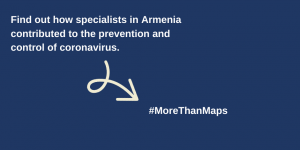Cadastre Committee of the Republic of Armenia
"The spread of the Covid-19 pandemic has led to unpredictable consequences in the world, however our cooperation with EuroGeographics has been very smooth with virtual events ensuring we remain connected. Our friendly and mutually beneficial relations will continue and have consistent development. Let me thank the Management Board, Secretary General and Executive Director and the entire staff of EuroGeographics for their best efforts in these difficult conditions to achieve the goals set by the organisation."
Suren Tovmasyan, Head of the Cadastre Committee of the Republic of Armenia
Specialists from the Center of Geomatics subdivision of the Cadastre Committee have supported the creation of electronic maps for the state to prevent and control coronavirus.
The maps use population figures to divide the country into zones with a responsible hospital. The corresponding subdivisions of the appropriate authorities were then separated for each zone. These electronic maps have contributed to the national response to Covid-19 and helped the relevant state bodies organise their work.
Creation of a unified address database
The Center of Geomatics geospatial data management unit is standardising both old and new addresses to create a unified platform for the address system. As a result of intensive cooperation with the local self-governing bodies, geographical names for the areas located inside settlements are being corrected.
Benefits
- Simplification of the address provision and registration process in the territory of the Republic of Armenia.
- Public awareness of the creation of address maps for each settlement.
- Contributes to creation of navigation system and maps in the future.
- Availability of address registry through an automated information system.
Launch of National Spatial Data Infrastructure
The concept of an integrated cadastre was approved by the Government in May 2019 and envisages the launch of National Spatial Data Infrastructure (NSDI) standards by 2023. The Cadastre Committee has already started work on the NSDI strategy and has developed a list of basic and custom (thematic) spatial data layers. Work is also focusing on developing standardisation documents for the NSDI, elaborating the integrated Cadastre strategy and the conformance of spatial data with the standards.
Benefits
- Facilitates the collection, processing and use of common spatial and cadastral data necessary for good governance.
- Contributes to the implementation of effective programmes for the economic development of marzes (provinces) and communities.
- Eliminates duplicate and conflicting cadastral data used in various sectors of the economy.
- Facilitates the process of creating backups of spatial data, increases operational efficiency and reduces costs.
- Ensures accessibility to spatial data and provides access to information for the public.
- Promotes the processes of developing internal mechanisms ensuring completeness, accuracy and reliability of data.
- Reduces time and working resources for provision of comprehensive spatial information to relevant bodies due to the availability of real-time access.

